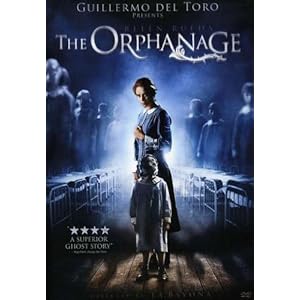 We hear a lot about being haunted around Halloween. It’s a word often used to reference ghosts, and what they do when they’re stuck between planes of existence; it’s also how certain movies make us feel, especially when their specters loom over our psyche long after the end credits have rolled. This is why terminology is important: Juan Antonio Bayona’s superior ghost story The Orphanage is only scary intermittently (although when it does aim to scare, watch out), but it will toy with you for days, even weeks on end.
We hear a lot about being haunted around Halloween. It’s a word often used to reference ghosts, and what they do when they’re stuck between planes of existence; it’s also how certain movies make us feel, especially when their specters loom over our psyche long after the end credits have rolled. This is why terminology is important: Juan Antonio Bayona’s superior ghost story The Orphanage is only scary intermittently (although when it does aim to scare, watch out), but it will toy with you for days, even weeks on end.
It’s rare for a horror movie to be humane. It’s not why we enjoy the art form; after all, we spend endless hours watching the same parade of pissant archetypes slaughtered for our amusement. The Orphanage has a heart that beats for the humans at its core; we don’t delight in their suffering, nor are we ever engineered to silently cheer anyone’s demise. The chips fall, and our heart often breaks for a few remarkably fully-formed characters. Yet, The Orphanage still qualifies as a horror movie; to fully explain how it does so while still maintaining its heartfelt core would be to give away key reveals that need to be experienced.
What I can tell you is that The Orphanage is tightly-coiled and suspenseful, full of tense imagery that fills the viewer with dread. Painted with the colors of that grey period when fall turns into winter, it’s a particularly dark film; our heroine Laura (Belen Rueda) seems to see the specter of her vanished son’s imaginary friend everywhere (shades of Nicholas Roeg’s similarly bleak 1973 triumph Don’t Look Now), and the image of the masked apparition burrows into the psyche early on. As a deeply psychological ghost story, it bears a certain visual and thematic resemblance to Alejandro Amenabar’s The Others, although it’s significantly less simplistic and much more accomplished. It’s not a thrill ride, but there’s a time bomb of tension ticking just beneath the surface; we spend a good deal of the film waiting for the other shoe to drop, and Bayona lays his cards on the table one at a time. We know just as much as we need to know, until we know too much.
All this to say: as fun as conventional horror movies can be, it’s nice when a movie can root a little deeper. One of The Orphanage’s greatest strengths is its characterization; Rueda, in particular, would be a shoo-in for a list of the most complex, emotionally draining performances ever mounted in a genre film like this. She plays everything just right: the obsession, the denial, the inevitable acceptance. The script gives her a lot to work with, too, granting her the opportunity to react to a series of astonishing plot upheavals. That’s another thing that gives The Orphanage a leg up: actual dramatic heft. To put it simply, it’s a devastating film; the best horror movies can shake us to our core, but when the puzzle pieces begin to snap into place, The Orphanage quickly becomes devastating. I initially saw it expecting a straightforward horror film, and The Orphanage was in a lot of ways everything I’d hoped for, but I was taken aback by the emotion of it all. Horror movie kills are often afterthoughts or punchlines; The Orphanage pulls no such punches, and deals with emotional trauma with the steady hand of high drama. If I were the kind of guy who cries at movies, The Orphanage would have had me in tears. Which is my reluctant way of admitting that The Orphanage had me in tears.
And yet, given that the purpose of this series is to give one’s self over to the pure pleasures of the holiday at hand, it’s important to note that The Orphanage absolutely does deliver the goods of a horror film. When a drugged Laura plays a hide-and-seek-esque game with a group of — ghosts? figments of the imagination? it’s never quite clear — little that’s been put on screen in the past decade measures up to the sheer terror. That The Orphanage functions as a legitimate, emotionally articulate, heartbreaking film is icing on the cake.
http://youtu.be/jA6pPzh6Bd4
Extra Credit: It’s hard to top The Orphanage in terms of the potent mixture of acting muscle, nervy scares, and emotional heft, but Mikael Hofstrom’s Stephen King adaptation 1408 gives it a real shot. John Cusack is a potent lead, the tension mounts steadily and effectively, and when Cusack’s hallucination of his dead daughter crumbles to dust in his arms, it’s difficult not to feel for the poor guy. As a side note, it’s an exceptionally rare example of PG-13 horror done right.
More 31 Days of Halloween:
Day 1: May
Day 2: The Night of the Hunter
Day 3: The Descent
Day 4: Night of the Demons
Day 5: Them
Days 6 & 7: Night of the Living Dead // Dawn of the Dead
Day 8: Behind the Mask: The Rise of Leslie Vernon
Day 9: A Tale of Two Sisters
Day 10: When a Stranger Calls // Amusement
Day 11: A Nightmare on Elm Street
